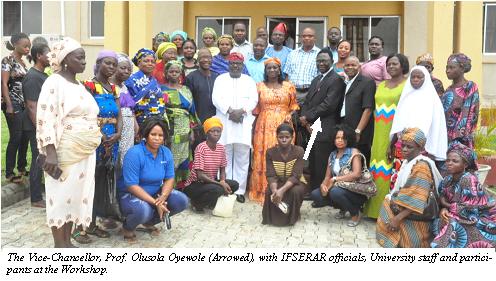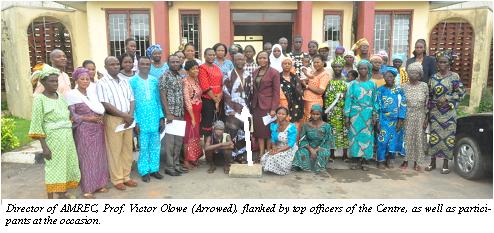The University’s Institute of Food Security, Environmental Resources and Agricultural Research (IFSERAR), in a bid to empower women in fishery production, has organised a five-day training workshop on “Aquaculture and Fisheries Production, Management, Processing and Value Addition”, in collaboration with the Federal Ministry of Agriculture and Rural Development, and a group, Growing Girls and Women in Nigeria.
Declaring the workshop open, the Vice-Chancellor and President of Association of African Universities, Professor Olusola Oyewole, appreciated the collaborators in organising the programme, in an effort to increase food production, create employment and reduce poverty. He congratulated the participants for being part of the maiden and specialised training programme, exclusively designed for women. He added that fishery production was an important aspect of the nation’s agricultural development because of its huge consumption, by virtually every segment of the country. Professor Oyewole said FUNAAB had played a significant role in the development of fisheries sector over the years, particularly in South-West in the areas of fingerlings, brood stock production and distribution under the West African Agricultural Productivity Programme (WAAPP) in the last 12 months.

The Director of IFSERAR, Professor Akin Omotayo, while welcoming participants, said the training had been structured in such a way as to make a layman to understand it, as there would be practical sessions outside the classrooms to enable participants gain more knowledge. He advised the participants who came from different states such as Kwara, Rivers, Akwa Ibom, Oyo and Ogun state, to take the advantage of the programme, to acquire more knowledge on fingerlings production.
The Permanent Secretary, Federal Ministry of Agriculture and Rural Development, Architect Sonny Echono, represented by the Deputy Director, Women in Agriculture, Mrs. Zainab Towogbola, said the training was important because it was in line with the present administration’s effort at addressing the problem of unemployment in the country which had become a threat to good quality life.
She added that the present government recognised the need to harness and mobilize the human resources of the country into actionable programmes that would make meaningful impacts on the economy, as government had set up a deliberate and aggressive drive for the training of unemployed youths and women nationwide on different agricultural enterprises along the value chains under crops, livestock and fisheries platforms. She added that at the end of the training, each co-operative society would be further supported and encouraged with a starter pack comprising fish tanks, smoking kilns, electric aerators, water testing kits, fish juveniles, medications and supplementary feeds that will promote technology adoption and economic engagement in aquaculture table fish production and processing. She urged the trainees to show a high level of participation, involvement and seriousness during the training so as to be fully integrated and put into practice, what they had learnt. The workshop was rounded-off with series of lectures on fish farming, fish pond construction, fish feed formation, fish marketing, processing and record keeping.
In a related development, women farmers from the FUNAAB Extension Areas as well as the Community-Based Farming Scheme (COBFAS) communities, have again been trained by the Gender Issues and Youth Development (GIYD) Programme of Agricultural Media Resource and Extension Centre (AMREC). This time around, in Snailery farming and the production of disinfectants.
While welcoming participants to the training workshop tagged, “Training of Trainers (TOT)”, the Vice-Chancellor, Professor Olusola Oyewole, commended members of staff of AMREC for their interest in the development of womanhood and for being good ambassadors of the University. Professor Oyewole, who was represented by the Director of AMREC, Professor Victor Olowe, described vocational training as the training for specific career or trade by focusing on the practical application of skills learnt and not necessarily based on theoretical or traditional academic knowledge. He added that it entailed hands-on-training and the link between education and the
working world in attaining poverty alleviation, self-empowerment, self-reliance, decreased youth unemployment and sustainable development.
He congratulated the beneficiaries for being chosen as representatives of their respective communities, adding that they stood to gain a lot from the TOT vocational training in the areas of enterprise development, enhanced income generation, self-esteem and marital stability. The Vice-Chancellor urged the participants to maximize the unique opportunity provided for them to acquire the needed skills and in turn, train other women in the various communities.
The Project Co-ordinator of GIYD, Dr. Olufunmilayo Oluwalana, appreciated the Vice-Chancellor for his support and interest in the empowerment of women as well as the resource person, Mrs. Aderele Gbemisola, for giving back to the society. The Co-ordinator noted that the knowledge gained from the training would boost their economic status and contribute to making their environment bacteria-free. She enjoined them to ensure they transferred the skills acquired to others in their various communities, while imploring them to strive to become entrepreneurs.
